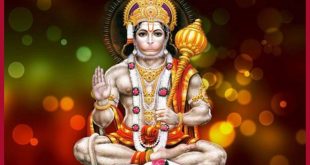It may be said that today’s youth are turning away from traditional professions like farming, ...
Read More »-
Richa Chadha’s Bundle of Joy: When Will the ‘Heeramandi’ Star’s Home Echo with Laughter?
Richa Chadha: Navigating Pregnancy While Promoting ‘Heeramandi’ Richa Chadha: Balancing Pregnancy and ‘Heeramandi’ Richa Chadha, ...
Read More » -
Heeramandi’s ‘Azadi’: A Deep Dive Into the Song That’s Taking Social Media by Storm
-
Unlock Tuesday’s Blessings: 5 Powerful Mangalwar Rituals for Peace and Prosperity
Mangalwar ke Upay: Practical Devotional Practices to Honor Lord Hanuman Mangalwar, or Tuesday, is a ...
Read More » -
Wedding Dreams: Harbingers of Joy or Warnings from the Unconscious?
-
Avoid Shani Dev’s Wrath: The Daily Mistakes You Must Stop Making Now!
-
Unlock Your Fortune: How Your Birthday Reveals Your Lucky Number and Peak Success Age
-
Decode Your Love Life: What Your Palm Lines Say About Marriage
-
Samson’s Fiery Bat Lights Up IPL 2024: Is He the Top Pick for the T20 World Cup?
Sanju Samson’s Explosive Batting Ignites IPL 2024 As the Indian Premier League (IPL) 2024 heats ...
Read More » -
Lucknow Super Giants’ IPL 2024 Campaign: The Mayank Yadav Fitness Miracle
-
Watch This Young Prodigy Smash Records: 20 Sixes and 6 Fours in Just 25 Balls
-
Shubman Gill’s Fiery Reaction Post-Defeat: Who’s Really at Fault?
-
The Future of Indian Cricket: Harbhajan Singh Reveals Surprising Pick for Next T20 Captain
-
Unraveling the Mystery: AstraZeneca Addresses Blood Clot Concerns in 10 Key Points
Covid Vaccine: Understanding AstraZeneca’s Admission of Blood Clot Risks in 10 Points Welcome to a ...
Read More » -
Exploding Myths: Unpacking Owaisi’s Claims on Condom Use Among Muslims with Government Data
-
Lok Sabha 2024: A Tale of Raja and Nawab in Modern Indian Politics
-
Supreme Court Ruling Unveiled: What Exactly is ‘Stridhan’ and How Much Can a Husband Claim?
-
Supreme Court Backs EVMs: Two Key Directives Issued for Election Commission to Implement
 Suspense Crime Sach Ka Dam
Suspense Crime Sach Ka Dam























